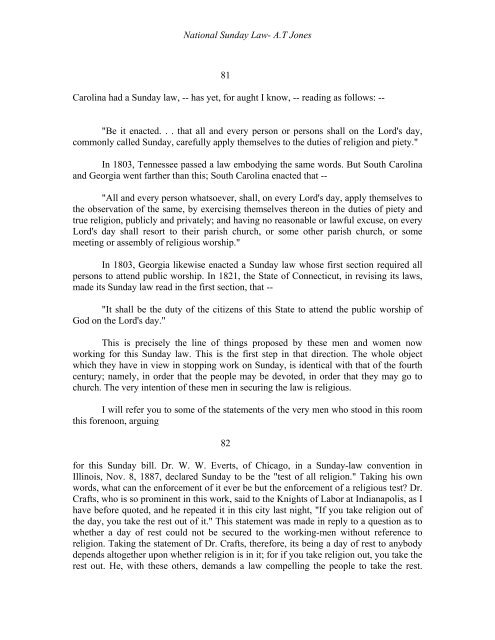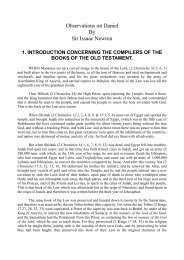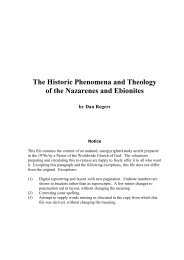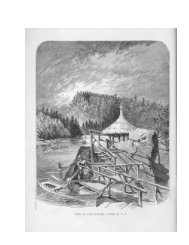THE NATIONAL SUNDAY LAW, ARGUMENT OF ALONZO T ...
THE NATIONAL SUNDAY LAW, ARGUMENT OF ALONZO T ...
THE NATIONAL SUNDAY LAW, ARGUMENT OF ALONZO T ...
Create successful ePaper yourself
Turn your PDF publications into a flip-book with our unique Google optimized e-Paper software.
National Sunday Law- A.T Jones<br />
81<br />
Carolina had a Sunday law, -- has yet, for aught I know, -- reading as follows: --<br />
"Be it enacted. . . that all and every person or persons shall on the Lord's day,<br />
commonly called Sunday, carefully apply themselves to the duties of religion and piety."<br />
In 1803, Tennessee passed a law embodying the same words. But South Carolina<br />
and Georgia went farther than this; South Carolina enacted that --<br />
"All and every person whatsoever, shall, on every Lord's day, apply themselves to<br />
the observation of the same, by exercising themselves thereon in the duties of piety and<br />
true religion, publicly and privately; and having no reasonable or lawful excuse, on every<br />
Lord's day shall resort to their parish church, or some other parish church, or some<br />
meeting or assembly of religious worship."<br />
In 1803, Georgia likewise enacted a Sunday law whose first section required all<br />
persons to attend public worship. In 1821, the State of Connecticut, in revising its laws,<br />
made its Sunday law read in the first section, that --<br />
"It shall be the duty of the citizens of this State to attend the public worship of<br />
God on the Lord's day."<br />
This is precisely the line of things proposed by these men and women now<br />
working for this Sunday law. This is the first step in that direction. The whole object<br />
which they have in view in stopping work on Sunday, is identical with that of the fourth<br />
century; namely, in order that the people may be devoted, in order that they may go to<br />
church. The very intention of these men in securing the law is religious.<br />
I will refer you to some of the statements of the very men who stood in this room<br />
this forenoon, arguing<br />
82<br />
for this Sunday bill. Dr. W. W. Everts, of Chicago, in a Sunday-law convention in<br />
Illinois, Nov. 8, 1887, declared Sunday to be the "test of all religion." Taking his own<br />
words, what can the enforcement of it ever be but the enforcement of a religious test? Dr.<br />
Crafts, who is so prominent in this work, said to the Knights of Labor at Indianapolis, as I<br />
have before quoted, and he repeated it in this city last night, "If you take religion out of<br />
the day, you take the rest out of it." This statement was made in reply to a question as to<br />
whether a day of rest could not be secured to the working-men without reference to<br />
religion. Taking the statement of Dr. Crafts, therefore, its being a day of rest to anybody<br />
depends altogether upon whether religion is in it; for if you take religion out, you take the<br />
rest out. He, with these others, demands a law compelling the people to take the rest.
















